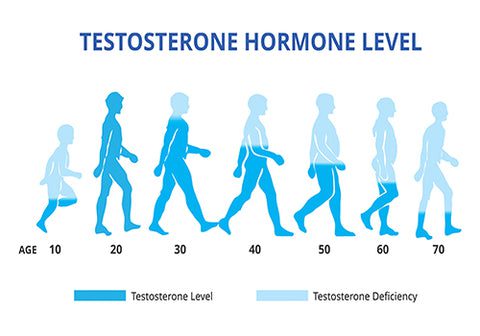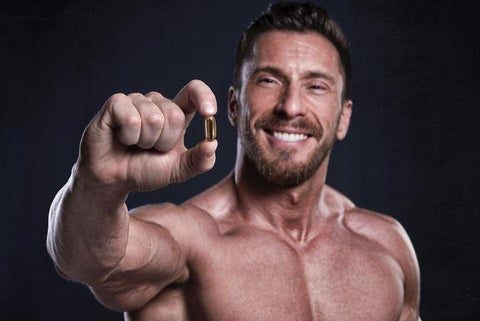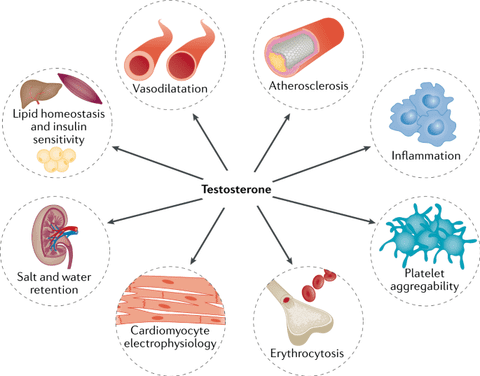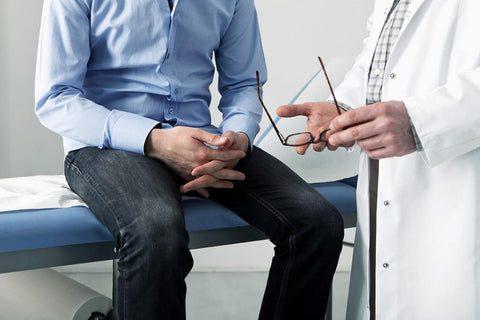Table of Contents
Testosterone is one of the most vital hormones in a man’s body.It is responsible for improving bone density, muscle strength, bone strength, libido, and sexual function.
As a man ages, their testosterone production reduces.Furthermore, testosterone levels in men have been on a decline over the decades due to several factors.
A 2007 study published in the Journal of Clinical Endocrinology and Metabolism revealed that testosterone levels in men of the same age group have been declining at a rate of 1 percent each year since the 1980s.
In other words, the average 55-year-old man in 1985 had 20 percent more testosterone than the average 55-year-old man in 2005.
This is partly why Testosterone Replacement Therapy (TRT) has been all the buzz over the last decade.
So, let’s find out more.
What Is Testosterone Replacement Therapy?
Testosterone Replacement Therapy is a medical procedure used to restore low levels of testosterone in men.
It is an FDA-approved method recommended for men who have low testosterone as a result of a prevailing medical condition.
A good example of such a condition is Late-Onset Hypogonadism (LOH) – a decrease in serum testosterone.
Symptoms of LOH include lowered libido, declining muscle mass and bone density, increasing body fat, and low mood.
TRT aims to restore optimal testosterone levels.
It can be administered in various ways including, through the muscles, nasal cavity, or transdermal application.
Supplementation through testosterone boosters for men is a good alternative to TRT.
How to Tell If You Have Low Testosterone


Testosterone levels are affected by many factors including, fitness level, medications, diet, and changing day times.
However, low testosterone is not a “feeling”.
You can only tell by seeing a licensed medical practitioner and having them perform a testosterone level test.
Most state laws require the test to be performed before administering TRT.
Just like all medical procedures, TRT has its pros and cons.
Nonetheless, there is a significant overlap in benefits for both TRT and testosterone boosters.
Benefits of TRT


Muscle Mass Increase
Tests done on men with LOH highlighted a growing risk of compromised mobility.
Clinical studies where men with LOH were administered TRT presented positive results regarding reversing drastic effects caused by reduced muscle mass and strength.
More specifically, TRT has been found to boost lipid oxidation, which in turn catalyzes muscle growth, and in the process, promotes a lean body physique.
It is attributed to improving the quality of life for patients whose mobility has been affected by a lack of sufficient muscle strength.
Improves Cardiac Health
In a 2013 study published by Touch Endocrinology, more than 3,500 men were observed in 17 years.
It was found that men with low levels of testosterone are at a greater risk of developing cardiovascular disease that could turn out fatal than those with normal levels.
Optimal levels of testosterone have also been found to promote high-density lipoprotein cholesterol, good systolic blood pressure, and low levels of insulin.
Maintaining healthy testosterone levels is one way to promote cardiovascular health.
Promotes Good Mood
Studies have linked several mood disorders to low levels of testosterone.
In older men, where treatment-resistance mood disorders are prevalent such as depression, there seems to also be a direct link to low testosterone.
While analyzing symptom scores for depression and anxiety, one study reported a significantly high amount of symptom scores in older men with low testosterone levels.
TRT is hailed by many renowned medical practitioners as a solution to counteracting mood disorders, including depression and anxiety.
Risks of TRT


Dermatological Issues
Where TRT is involved, dermatological issues have been found, in some cases, to present in two ways.
First, serum testosterone has been linked to an increase in sebum secretion; a key catalyst of acne.
However, experts note that this doesn’t often happen, and when it does, it is usually mild.
Second, topical applications, as well as intramuscular administration of TRT, may cause skin reactions especially to men with sensitive skins.
These reactions may manifest as erythema or pruritus.
Potential Effect on Prostate Health
Given that the prostate is essentially a gland that relies heavily on androgen, any procedure involving anti-androgen agents such as those in TRT is bound to have some consequences.
TRT has been reported to cause a decrease in prostate volume.
Additionally, some studies have also found evidence suggesting that the procedure aggravates prostate tumor growth.
Certain prostate cancer drugs are centered on lowering testosterone levels in the body.
Before embarking on a TRT procedure, you might want to check first with an oncologist.
Potential Liver Issues
There is substantial research linking hepatic diseases to endogenous testosterone.
While the specifics are not yet clear, scientists note an increased risk of developing hepatotoxicity, liver disease, hepatic failure, and intrahepatic cholestasis where TRT is involved.
Testosterone Boosters Are an Excellent Alternative
TRT is unquestionably costly.
Depending on your location, health insurance plan, and availability of a generic version, the total cost of TRT ranges anywhere between $1,700 and $3,200 per year.
Some health care facilities have been known to charge as high as $1,000 per month.
In stark contrast, testosterone-booster which can achieve the same results, range in price from $10 to $40 for doses that can last several weeks.
Furthermore, testosterone boosters have negligible to no side effects and are less invasive than TRT.
Talk to Your Doctor About TRT


Just like all medical procedures, Testosterone Replacement Therapy has its merits and demerits.
Medical practitioners must discuss all the potential adverse effects of TRT with their patients first.
While it has, no doubt helped many people with hypogonadism, caution should be exercised when considering TRT for men without any underlying conditions.
Testosterone booster for men is a great substitute to TRT that must also be discussed with a medical practitioner first before administration.
Be sure to report any unexpected or unwanted side effects of TRT or testosterone boosters for men
References
1. Thomas G. Travison, Andre B. Araujo, Amy B. O’Donnell, Varant Kupelian, & John B. McKinlay, New England Research Institutes; The Journal of Clinical Endocrinology & Metabolism (2007): “A Population-Level Decline in Serum Testosterone Levels in American Men”. Retrieved from “https://academic.oup.com/jcem/article/92/1/196/2598434
2. Polackwich A. S., Tadros N. N., Ostrowski K. A., and Hedges J. C., European Endocrinology (2013)“Benefits and Consequences of Testosterone Replacement Therapy: A Review. Retrieved from “https://www.touchendocrinology.com/general-endocrinology/journal-articles/benefits-and-consequences-of-testosterone-replacement-therapy-a-review/
3. Chloe Bennett, B.Sc. Dr. Jennifer Logan, MD, MPH, News Medical Life Sciences (Updated July, 2019): “Testosterone Replacement Therapy for Men: Risks and Benefits”. Retrieved from “https://www.news-medical.net/health/Testosterone-Replacement-Therapy-for-Men-Risks-and-Benefits.aspx”

